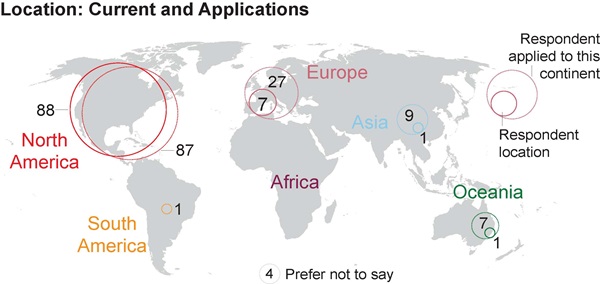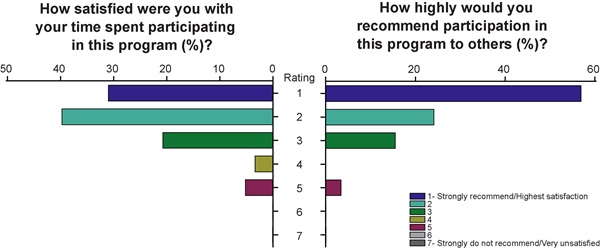A new biological science practices paper in Proceedings B discusses a new peer reviewing program to help postdocs with faculty applications.

Applying for a faculty position is a tough process with postdoctoral fellows having to prepare lengthy, time-consuming job applications. Often mentors and colleagues review these applications but their feedback may not always be as extensive as that of the academic search committee. A new biological science practices paper in Proceedings B describes a new peer reviewing program for postdocs where they receive reciprocal, iterative feedback on faculty applications. Lead author Kathleen Grogan from University of Cincinnati tells us more about the background of the program and its results so far.
Tell us about your paper
Our paper presents a pilot program using peer networking to support postdocs as they apply for faculty positions and help them improve their application materials. Peer review programs are productively used for manuscripts and grant applications, and have been implemented for professional development and community building purposes in many other contexts. Because of this, we thought that this would be an excellent new application for these tools. Through a process of reciprocal constructive commentary, program participants pursue their ultimate goal of achieving a faculty position in a supportive and encouraging community.
In this paper, we describe the program and present results from a survey assessing participants' experiences and identifying benefits and areas for improvement. Survey data analysis and interpretation of observed trends are presented in the context of the original purpose of launching this program through the FuturePI Slack community.

Map of the current location of survey respondents (solid circles) compared to the location of positions to which respondents applied (dashed circles).

Participants indicated how satisfied they were with their participation in the FuturePI Reviewing Groups Program and how highly they would recommend participation in the Program to others.
Our work provides insight into the advantages of a peer support community for academic job seekers at the postdoc level, the importance of peer feedback and support in improving job application materials, and the potential for peer networking to address disparities in mentorship and academic hiring practices. Programs like this provide postdocs with a supportive community of peers during their difficult job search. To that end, we also provide an implementation guide for others who wish to pilot a similar program!
In the future, we would like to explore the impact of peer networking on academic job satisfaction and retention rates. Providing mentorship to academic job seekers and how it can be integrated with peer networking programs is something we believe can help patch the 'leaky pipeline' and close the gap for colleagues struggling to stay in academia during and after postdoctoral training. To achieve this goal, longitudinal studies are needed to determine how peer networking affects academic careers over time and to consider other areas of professional development that could benefit from similar programs for postdocs.
How did the idea of the paper come about?
As a postdoctoral fellow on the job market myself, I organized the program described in this manuscript by myself from its inception in 2018 through the application season of 2020, when I landed my own tenure-track faculty position. I knew that I would be transitioning out of the FuturePI Slack community and that it was time to hand the organization of the Program to new individuals who could keep it going and help it grow! The other authors on this paper were all postdoctoral fellows at the time who volunteered to help organize the Program for the 2021-2022 job season.
.jpg?h=222&w=600&hash=8F5EF8D6B3D711D10CB0E9C4B28D61DD)
The authors: Carlos M. Guardia, Erin Kane, Alison G. Tebo, Anna A.W.M. Sanders, Devrim Kaya, and Kathleen E. Grogan.
The idea for this paper came to me as we were starting that season of the Program up: It seemed to me from feedback I was receiving, that this Program was incredibly helpful for some people, and that when I told other academics about it outside of FuturePI Slack, they were impressed and thought it was an innovative and useful idea. Furthermore, the COVID-19 pandemic had made it difficult for many of the authors to conduct our own research at the time due to the inability to travel to the field or get laboratory supplies in a timely fashion – publishing a description of the Program along with survey data documenting its effectiveness seemed like a good way to get another publication for an entire team of early career researchers who were heavily affected by the pandemic at the time. As anyone who has ever worked on a great team knows, this project was one of the easiest I’ve ever put together and this paper was one of the most enjoyable to write.
How was the publishing experience in Proceedings B?
We did, however, struggle to find a home for this paper, as the topic isn’t a traditional one for most scientific journals. In fact, it sat at one journal for months while they searched for an editor who could handle it. When the Proceedings B Preprint editor Maurine Neiman emailed us to ask if we would submit it to the journal for their new category of biological science practices, that seemed like a match made in heaven, which it has turned out to be. From the submission process to the reviews, the experience from solicitation to publication has been straight-forward and enjoyable, including the reviewer comments which were extremely supportive and provided multiple excellent suggestions (e.g., the note about the usage of current and future terminology regarding gender and race/ethnicity). I’m really excited and pleased that scientists have decided to turn our scientific scrutiny to improving the process of doing science and being scientists and am hopeful that this manuscript will make a meaningful addition to that growing body of research.
Proceedings B is looking to publish more high-quality Biological Science Practices papers. More information about the journal and how to submit can be found here.
Image credits
Top image by Gerd Altmann from Pixabay
Map of the current location of survey respondents (solid circles) compared to the location of positions to which respondents applied (dashed circles). Figure 2(G) from the paper.
Participants indicated how satisfied they were with their participation in the FuturePI Reviewing Groups Program and how highly they would recommend participation in the Program to others. Figure 5(E) from the paper.
Group photo of authors, provided by Kathleen Grogan.



